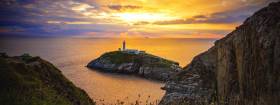Displaying items by tag: Welsh Wind Project
Minesto And Stena Line In Joint Project of Renewable Energy Sector off Holyhead Wales
#HolyheadDeep - Two Swedish-based companies have engaged in a joint project to invest in Wales’ transition to renewable energy.
Minesto and Stena Line will build an assembly hall in the Port of Holyhead, which Minesto will utilise in their upcoming rollout of the company's unique technology to generate clean electricity from the ocean.
Both companies have signed an agreement in which Stena Line has committed to building an assembly hall on their land at the north-west Welsh port. The assembly hall will be leased to Minesto and used for the upcoming rollout of Deep Green, Minesto’s unique technology for cost-effective electricity production from slowly flowing underwater currents.
Minesto’s first commercial power plant array will be installed in Holyhead Deep off the coast of North Wales. The joint-project companies invites the public for your opinion! so click here for more.
The company recently announced plans to expand the project from 10MW to 80MW installed capacity. This expansion would allow Minesto’s power plants to supply as many as 80,000 Welsh households with locally produced, reliable and renewable electricity.
The assembly hall in Holyhead is a key part of this process, allowing both assembly and service and maintenance of the power plants to take place in the port.
“We are very pleased to have finalised this agreement with Stena Line. With its direct quay access for offshore transports to and from site we have secured a unique location that suits us perfectly. In the establishment of our technology, it is also crucial to work with professional and long-term partners such as Stena Line. We are two companies from Gothenburg, exploiting these ocean energy business opportunities together in Wales, which adds to the excitement”, says Dr Martin Edlund, CEO of Minesto.
Stena Line has been active in Holyhead for many years, as owner of the port and through operating five ferry routes between Ireland and the UK.
“This investment creates value for Stena Line in several ways and demonstrates opportunities in port operations linked to ocean renewables”, says Björn Petrusson, Chief Commercial Officer at Stena Line. “Our sustainability strategy has a clear focus on clean energy so participating in the development of new renewable energy sources is natural to us. This investment is good for our business and is also an investment in a better future for all of us”, Björn Petrusson concludes.
The assembly hall is scheduled for completion in June 2017.
























































